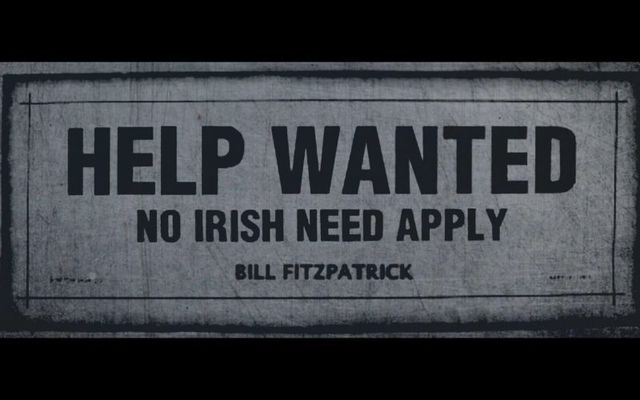"No Irish Need Apply" is a short documentary film chronicling the terrible history of discrimination against the Irish in 1800s Boston.
It was made by Bill Fitzpatrick, an IrishCentral reader from Boston who has delved into researching the history of No Irish Need Apply advertisements his ancestors encountered when they arrived in America.
He was inspired by Rebecca Fried, the amazing teenager from Washington, DC who in 2015 published a scholarly article in the Oxford Journal of Social History disproving the claims of Professor Richard Jensen, who had long been a dominant voice on the topic, arguing that No Irish Need Apply was a myth.
In a wonderfully written and researched rebuttal, Fried challenged Jensen’s claim that “the NINA phenomenon is an ahistorical memory to be explained by ‘delu[sional]’ group psychology and ‘the political need to be bona-fide victims’ rather than by the fact of historic discrimination.”
Instead, she wrote, “the documentary record better supports the earlier view that Irish-Americans have a communal recollection of NINA advertising because NINA advertising did, in fact, exist over a substantial period of United States history, sometimes on a fairly widespread basis.”
Using her digital savvy, Fried searched online newspaper archives and databases to find decades worth of No Irish Need Apply ads from across the US, definitively setting the record straight.
"Growing up in Boston I heard about the signs and knew the history of anti-Irish sentiment from my grandparents and other Irish who settled in Boston," Fitzpatrick told IrishCentral, "so I thought I would try to find some examples.”
He was shocked by the great number he found among the classified ads for work, particularly from the 1880s and 90s. Four listed addresses in his old neighborhood.
The ads he found paint a vivid picture of the bigotry faced by the Irish then, in addition to other groups. Some state “No Irish or Catholics wanted” or “positively no Irish or Catholics,” others “No Jews, Irish or drunkards need apply.” Some specify preference for American, English, or German girls to work as housemaids or nannies, others allowing “colored ok.”
After sharing his initial cut of his documentary with IrishCentral, Fitzpatrick worked on a polished version that made the rounds at Irish film festivals.
Meaningfully, he’s also shown it to the Fried family, with Professor Kerby Miller, who assisted Rebecca in her research for her article, and with Professor Richard Jensen, whose theory she worked to disprove.
Despite the shocking testaments to the prevalence of discrimination it contains, the film ends on a positive note.
As Fitzpatrick put it, “We took our lumps, but with hard work, love of our adopted country, and perseverance we not only survived but thrived!”
*Originally published in 2017. Last updated in 2023.




Comments